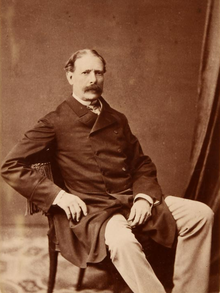António Maria de Fontes Pereira de Melo
| Fontes Pereira de Melo | |
|---|---|

Fontes Pereira de Melo in 1883
|
|
| 33rd Prime Minister of Portugal | |
|
In office 13 September 1871 – 6 March 1877 |
|
| Monarch | Luís I |
| Preceded by | António José de Ávila |
| Succeeded by | António José de Ávila |
| 35th Prime Minister of Portugal | |
|
In office 26 January 1878 – 29 May 1879 |
|
| Monarch | Luís I |
| Preceded by | António José de Ávila |
| Succeeded by | Anselmo José Braamcamp |
| 38th Prime Minister of Portugal | |
|
In office 14 November 1881 – 16 February 1886 |
|
| Monarch | Luís I |
| Preceded by | António Rodrigues Sampaio |
| Succeeded by | José Luciano de Castro |
| Personal details | |
| Born |
8 September 1819 Lisbon, Portugal |
| Died | 22 January 1887 (aged 67) Lisbon, Portugal |
| Political party | Regenerator Party |
António Maria de Fontes Pereira de Melo GCTE KGF (Portuguese pronunciation: [ˈfõtɨʃ pɨˈɾɐjɾɐ dɨ ˈmɛlu]; Lisbon, 8 September 1819 – 22 January 1887) was a Portuguese statesman, politician, and engineer. Historically, he was a very important political figure, deputy, and in several occasions minister, six times Minister of Finance.
Pereira de Melo is mostly remembered for conducting dynamic industrial and public infrastructure policy which become known as Fontismo (after his name). He also implemented educational reforms in accordance with the industrialization process he initiated (see Instituto Industrial de Lisboa and Escola Industrial do Porto).
He was born to Lisbon and was the son of João de Fontes Pereira de Melo, the 75th and 78th colonial governor of Cape Verde and wife and first cousin Jacinta Venância Rosa da Cunha Matos.
At age 13 in 1832, he studied at the Academy of Marine Guards. The Portuguese Civil War was taken place between the constitionalists and Miguelists (or Michaelists). He sided with the Miguelists and took part in a battle on October 10, where the Miguelist troops commanded by the Marshal of Bourmont which was repelled.
As a young lieutenant was elected deputy for Cape Verde, the candidature was rejected by the commission on 31 March 1848 and no elections took place.
...
Wikipedia
